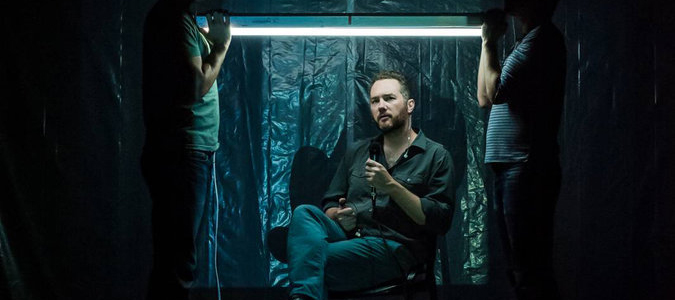

Juárez: A Documentary Mythology
Opening Night: September 10, 2014
Closing: October 5, 2014
Theater: Rattlestick Theatre
America is beginning to learn, live, function and thrive in borderlands beyond its literal borders; requiring increasingly global conversations and awareness. Nowhere is this more apparent than the twin community of El Paso, TX – “Safest City in America” per capita – and Cd. Juárez, Mexico – “The Murder Capital of the World”. Drawn by the contradictions, history and mythology within and around this unique landscape, Theater Mitu conducted a series of interviews and investigations over a two year period to explore the ever complicated landscape at this historic US/Mexico border. Led by Theater Mitu’s Artistic Director, Rubén Polendo (born and raised in Juárez), the company creates an artistic and emotional map of El Paso/Cd. Juárez, incorporating verbatim transcripts and a deep investment in the voice of this community. The work frames Mitu company members as witnesses to memory and myth; vehicles of transmission of the many stories that create a conflicted history of this incredibly polemic border.
BUY TICKETSREAD THE REVIEWS:
September 10, 2014
How did Juarez, a Mexican border town said to be the birthplace of the burrito and the margarita, become labeled the Murder Capital of the World, specializing in violence against young women? That’s the main question that the New York based company Theater Mitu, led by Juarez-born artistic director Ruben Polendo, sets out to answer in Juarez: A Documentary Mythology, an ambitious work of theater that is playing at the Rattlestick Playwrights Theater through October 5th as part of the 2014 Theatre: Village Festival. Over several years, Mitu company members conducted research and interviewed hundreds of residents of Juarez and its sister city right on the other side of the Rio Grande, El Paso, Texas, which calls itself the safest city in America. The six performers on stage repeat some of what dozens of those residents said, each accompanied by a title on a video monitor that identifies the speaker only by occupation and age (not by name.) On the screen: “Interview: Psychotherapist. Age 50. Juárez.” Performer: “…Juárez once was pretty, an extremely beautiful city surrounded by cotton fields.” On the screen: “Interview: Hip Hop Artist. Age 19. Juárez.” Performer: “I know that Juárez is not the best city for women because of femicides, …But we don’t seek pity. We want this problem to get fixed.”
READ THE REVIEWJanuary 14, 2014
Theater Mitu’s Juárez – A Documentary Mythology follows the template laid out more than a decade ago by Moisés Kaufman’s The Laramie Project: focus on a dramatic subject matter; interview a wide spectrum of people who observed or were participants; and then edit and shape the comments into a cohesive show. The Mitu creative team has taken on the recent tumultuous history of the border town Ciudad Juárez, Mexico just across the Rio Grande from El Paso, Texas. What was formerly a calm, productive, tightly knit community closely aligned with its American neighbor became, after NAFTA devastated the local industries, not just a major mover of illicit drugs but the murder capital of the world. How this city devolved is meticulously documented in Juárez at the Rattlestick Playwrights Theater in Greenwich Village. The show is bookended by home movies of Rubén Polendo’s middle class family in Juárez, showing his three sisters, his mom and dad enjoying the good life as pillars of their community, members of the Lion’s Club, believing they had a future in their beloved hometown. Polendo’s loving commentary and calm observations put the extraordinarily violent tale of a city drowning in graft and blood in ironic relief.
READ THE REVIEWSeptember 10, 2014
Art, more often than not, is an outlet for subjective thought. An artist uses his creative medium to offer a concise and compelling snapshot of the world as it appears through his own personal filter of observation. Theater Mitu Artistic Director Rubén Polendo, however, confidently rejects this widely accepted archetype in Juárez: A Documentary Mythology, now in performances at Rattlestick Playwrights Theater. He makes a compelling though not entirely convincing argument for art without subjectivity in this innovative performance piece, offering a not dramatized, but theatricalized exploration of his hometown of Juárez on the U.S.-Mexico border. A collaborative company project, Juárez: A Documentary Mythology engages its actors as characterless mouthpieces for Juárez citizens whose firsthand accounts have been amassed in an extensive catalog of recorded interviews. Information without emotion becomes the clear objective throughout the piece as the performers trade off responsibilities reading facts from note cards or reciting recorded testimonies funneled to them through ear pieces. Polendo is forthright with his purpose from the start, opening the production with a series of home videos of his happy childhood in Juárez before the city was overtaken by drug cartels and gang violence. “I needed to understand what had happened to the city — what happened to my city,” he narrates over the joyful images.
READ THE REVIEWSeptember 11, 2014
He is a dashing man, charming us in scraps of old home movies and the stories his son tells. The New York director Rubén Polendo has made a theater piece examining his violence-ridden hometown, Ciudad Juárez, Mexico, and this man, who still lives there, is his father. “Mijo,” Mr. Polendo’s father tells him, “all this is very real. It’s sad, and it’s difficult. And it’s not a story, or a play, or a myth. It’s the life of a city.” That mutable life, just across the river from El Paso, Tex., is the subject of Theater Mitu’s Juárez: A Documentary Mythology, a scrupulously respectful interview-based show staged at Rattlestick Playwrights Theater as part of the Theater: Village festival. Mr. Polendo grew up in Juárez in the 1970s and ’80s. Only later did it become a place “of drug smugglings, killings, corruption and violence,” he says. It was known for a time as the murder capital of the world. “I needed to understand what had happened to the city,” he says in a voice-over. So he and the theater company went to inquire.
READ THE REVIEW




















